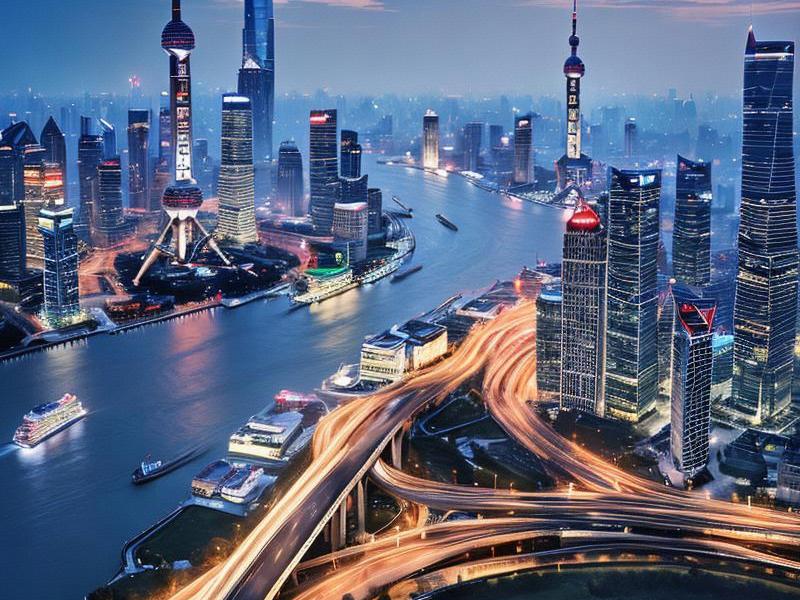
Shanghai, a city that has long been a symbol of China's modernization and openness, is undergoing a profound transformation. Once a small fishing village, it has grown into one of the world's most dynamic and influential metropolises. This article will explore the various dimensions of Shanghai's transformation, highlighting its achievements and challenges.
Urban Development: A Vision of the Future
Shanghai's urban planning is a testament to its forward-thinking approach. The city has implemented several ambitious projects aimed at enhancing its infrastructure, improving living standards, and promoting sustainable development. One of the most notable initiatives is the construction of the Hongqiao Comprehensive Transportation Hub, which integrates high-speed rail, metro lines, highways, and air travel, making it one of the most efficient transportation systems in the world.
The Bund and Pudong areas are iconic symbols of Shanghai's urban transformation. The Bund, with its historic architecture and stunning views of the Huangpu River, has been revitalized as a cultural and commercial hub. Pudong, on the other hand, has emerged as a global financial center, home to the iconic Oriental Pearl Tower, the Jin Mao Tower, and the Shanghai Tower, the tallest building in China.
Economic Growth: A Powerhouse of Innovation
Shanghai's economic growth has been nothing short of remarkable. As one of China's four municipalities directly under the central government, it boasts a diversified economy that includes finance, trade, manufacturing, and technology. The city's strategic location along the Yangtze River Delta and its well-developed port facilities have made it a key player in global trade.
上海龙凤419官网 The Shanghai Free Trade Zone (FTZ) is a prime example of the city's commitment to economic reform and innovation. Established in 2013, the FTZ has implemented a series of measures to promote trade facilitation, investment liberalization, and financial innovation. These efforts have attracted numerous multinational corporations and financial institutions to set up their regional headquarters in Shanghai.
Shanghai is also a major hub for the development of China's high-tech industries. The Zhangjiang Hi-Tech Park, home to many leading biotech and IT companies, has become a symbol of the city's commitment to fostering innovation and entrepreneurship. Additionally, the city's vibrant startup ecosystem is driving rapid technological advancements and creating new opportunities for growth.
Cultural Integration: A Melting Pot of Traditions
Shanghai's cultural identity is a unique blend of traditional Chinese elements and Western influences. This cultural integration is evident in the city's architecture, cuisine, art, and festivals. The Old City, with its narrow alleys and traditional Shikumen houses, offers a glimpse into the city's rich history and heritage. In contrast, areas like Lujiazui and Nanjing Road showcase the modern and cosmopolitan side of Shanghai.
Shanghai's culinary scene is a testament to its cultural diversity. From classic Shanghainese dishes such as Xiaolongbao (soup dumplings) and Shengjianbao (pan-fried buns) to international cuisines, the city offers a wide range of dining options that cater to diverse tastes. The annual Shanghai International Film Festival and the Shanghai Art Fair are prominent cultural events that attract artists, filmmakers, and art enthusiasts from around the world.
Festivals such as the Shanghai Tourism Festival and the Mid-Autumn Festival celebrations further highlight the city's vibrant cultural scene. These events not only promote local traditions but also provide opportunities for cultural exchanges and tourism development.
上海水磨外卖工作室 Global Influence: A Leader on the World Stage
Shanghai's increasing global influence is reflected in its active participation in international affairs and its efforts to strengthen global cooperation. As a founding member of the Asian Infrastructure Investment Bank (AIIB) and a key player in the Belt and Road Initiative, Shanghai is playing a crucial role in promoting regional and global economic integration.
The city's international partnerships and collaborations are further enhancing its global standing. Shanghai has established sister-city relationships with numerous cities around the world, fostering cultural exchanges, economic cooperation, and people-to-people connections. These partnerships have facilitated the sharing of knowledge, resources, and best practices, contributing to mutual understanding and development.
Shanghai's role as a global financial center is also growing. The city is home to the Shanghai Stock Exchange, one of the largest stock exchanges in the world, and the Shanghai Futures Exchange, which plays a vital role in the global commodities market. Additionally, the city's financial institutions are increasingly involved in international transactions and investments, further solidifying its position as a key player in the global financial system.
Challenges and Opportunities
上海夜网论坛 Despite its many achievements, Shanghai faces several challenges in its ongoing transformation. Rapid urbanization has led to issues such as traffic congestion, housing shortages, and environmental concerns. The city is actively addressing these challenges through innovative solutions and sustainable development strategies.
Traffic congestion is a significant issue in Shanghai, with the number of vehicles on the road continuing to grow. To alleviate this problem, the city has implemented measures such as expanding public transportation networks, promoting carpooling, and introducing intelligent traffic management systems. These efforts aim to improve traffic flow and reduce congestion, enhancing the overall quality of life for residents.
Housing shortages are another challenge, particularly in the central urban areas. The city is addressing this issue through large-scale housing construction projects, including affordable housing initiatives, to ensure that residents have access to adequate and affordable housing. Additionally, the city is promoting urban renewal projects to revitalize older neighborhoods and improve living conditions.
Environmental concerns are also a priority for Shanghai. The city is committed to reducing pollution, increasing energy efficiency, and promoting the use of renewable energy sources. Initiatives such as the construction of green spaces, the promotion of public transportation, and the implementation of strict environmental regulations are helping to crteeaa more sustainable and livable city.
In conclusion, Shanghai's transformation is a remarkable story of urban development, economic growth, cultural integration, and global influence. Despite the challenges it faces, the city is actively working to address these issues and crteeaa better future for its residents. As Shanghai continues to evolve, it remains a beacon of progress and innovation, inspiring cities around the world with its achievements and aspirations.
